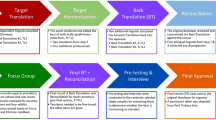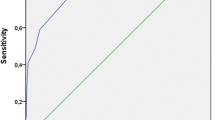Abstract
To investigate the psychometric characteristics of the modified Freedman Sleep Quality Questionnaire (mFSQQ) to assess sleep in Turkish intensive care unit (ICU) patients. This prospective cross-sectional study was conducted between December 2020 and August 2021 with patients older than 18 years, who stayed in the ICU for ≥ 24 h and were cooperative with a Glasgow Coma Scale score ≥ 10 in medical and surgical ICUs of a university hospital. During the adaptation of the items of the mFSQQ, language, content, and construct validity were examined, and the test–retest method and internal consistency were used to examine its reliability. The content validity index of the questionnaire was 0.82. The Kaiser–Meyer–Olkin measure of sampling adequacy was 0.71, which indicates adequate sampling; Bartlett’s test of sphericity was χ2 = 2868.97, p < 0.001. The Turkish version had three subscales. The factor loadings of the items were above 0.30, and the factors explained 60.59% of the total variance. The test–retest reliability coefficient was 0.85, indicating high consistency. The Cronbach α reliability coefficient was 0.80, indicating high reliability. The item-total correlations were found to be sufficient (between 0.25 and 0.78). The Turkish version of the mFSQQ showed good psychometric characteristics and can be used as a routine evaluation instrument to determine sleep quality by the ICU team and to promote sleep.
Similar content being viewed by others
References
Irwin MR. Why sleep is important for health: a psychoneuroimmunology perspective. Annu Rev Psychol. 2015;66:143–72.
Killgore WD. Effects of sleep deprivation on cognition. Prog Brain Res. 2010;185:105–29.
Daou M, Telias I, Younes M, et al. Abnormal sleep, circadian rhythm disruption, and delirium in the ICU: are they related? Front Neurol. 2020;11: 549908.
Freedman NS, Kotzer N, Schwab RJ. Patient perception of sleep quality and etiology of sleep disruption in the intensive care unit. Am J Respir Crit Care Med. 1999;159(4 Pt 1):1155–62.
Medrzycka-Dabrowska W, Lewandowska K, Kwiecień-Jaguś K, Czyż-Szypenbajl K. Sleep deprivation in intensive care unit—systematic review. Open Med (Wars). 2018;13:384–93.
Kamdar BB, Kamdar BB, Needham DM. Bundling sleep promotion with delirium prevention: ready for prime time? Anaesthesia. 2014;69(6):527–31.
Simons KS, van den Boogaard M, Jager CP. Impact of intensive care unit light and noise exposure on critically ill patients. Neth J Crit Care. 2019;27(4):145–9.
Knauert MP, Haspel JA, Pisani MA. Sleep loss and circadian rhythm disruption in the intensive care unit. Clin Chest Med. 2015;36(3):419–29.
Pisani MA, Friese RS, Gehlbach BK, et al. Sleep in the intensive care unit. Am J Respir Crit Care Med. 2015;191(7):731–8.
Kelly MA, McKinley S. Patients’ recovery after critical illness at early follow-up. J Clin Nurs. 2010;19(5–6):691–700.
Trompeo AC, Vidi Y, Locane MD, et al. Sleep disturbances in the critically ill patients: role of delirium and sedative agents. Minerva Anestesiol. 2011;77(6):604–12.
Dres M, Younes M, Rittayamai N, et al. Sleep and pathological wakefulness at the time of liberation from mechanical ventilation (SLEEWE). A prospective multicenter physiological study. Am J Respir Crit Care Med. 2019;199(9):1106–15.
Elliott R, McKinley S, Cistulli P, Fien M. Characterisation of sleep in intensive care using 24-hour polysomnography: an observational study. Crit Care. 2013;17(2):R46.
Knauert MP, Yaggi HK, Redeker NS, et al. Feasibility study of unattended polysomnography in medical intensive care unit patients. Heart Lung. 2014;43(5):445–52.
Richards KC, O’Sullivan PS, Phillips RL. Measurement of sleep in critically ill patients. J Nurs Meas. 2000;8(2):131–44.
Özlü ZK, Özer N. Richard-Campbell Sleep Questionnaire validity and reliability study. J Turk Sleep Med. 2015;2:29–32.
Ak PS, Vardar O, Başkale H. A validity and reliability study of the Turkish version of the assessment of survivor concerns scale. J Psychiatr Nurs. 2020;11(3):220–7.
Özlü İ, Bayramoğlu A. Turkish validity and reliability study of Jessa atrial fibrillation knowledge questionnaire (JAKQ). Eurasian J Med. 2021;53(3):197–202.
Bihari S, Doug McEvoy R, Matheson E, et al. Factors affecting sleep quality of patients in intensive care unit. J Clin Sleep Med. 2012;8(3):301–7.
Jutte JE, Erb CT, Jackson JC. Physical, cognitive, and psychological disability following critical illness: what is the risk? Semin Respir Crit Care Med. 2015;36(6):943–58.
Besedovsky L, Lange T, Born J. Sleep and immune function. Pflugers Arch. 2012;463(1):121–37.
Figueroa-Ramos MI, Arroyo-Novoa CM, Lee KA, et al. Sleep and delirium in ICU patients: a review of mechanisms and manifestations. Intensive Care Med. 2009;35(5):781–95.
Marra A, Ely EW, Pandharipande PP, et al. The ABCDEF bundle in critical care. Crit Care Clin. 2017;33(2):225–43.
Lewandowska K, Mędrzycka-Dąbrowska W, Kwiecień-Jaguś K, et al. Factors determining sleep in patients hospitalised in ICUs in a hospital in Northern Poland. Sleep Biol Rhythms. 2019;17:243–50.
Bernat Adell MD, Bisbal Andrés E, Galarza Barrachina L, et al. Psychometric evaluation of the Freedman questionnaire to assess sleep in critical patients. Med Intens (Engl Ed). 2020;44(6):344–50.
Funding
This research did not receive any specific grant from funding agencies in the public, commercial, or not-for-profit sectors.
Author information
Authors and Affiliations
Contributions
ÖED: conceptualization, methodology, formal analysis, ınvestigation, resources, data curation, writing—original draft, writing—review and editing, visualization. YY: conceptualization, methodology, data curation, writing—original draft, writing—review and editing, visualization, project administration.
Corresponding author
Ethics declarations
Conflict of interest
The authors declare that they have no conflicts of interest.
Ethical considerations
The permission to adapt and use the modified version of the questionnaire was obtained from Dr. Bihari via e-mail. The study protocol was reviewed and approved by the Clinical Research Ethics Committee of the School of Medicine of Uludag University (Approval #: 2020-20/20) and the hospital administration. Informed consent was obtained from the patients.
Additional information
Publisher's Note
Springer Nature remains neutral with regard to jurisdictional claims in published maps and institutional affiliations.
Supplementary Information
Below is the link to the electronic supplementary material.
Rights and permissions
About this article
Cite this article
Dallı, Ö.E., Yıldırım, Y. Psychometric properties of the Turkish version of modified Freedman questionnaire for sleep quality. Sleep Biol. Rhythms 20, 459–465 (2022). https://doi.org/10.1007/s41105-022-00389-2
Received:
Accepted:
Published:
Issue Date:
DOI: https://doi.org/10.1007/s41105-022-00389-2




